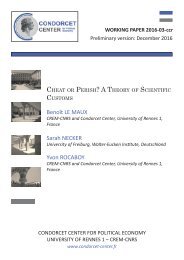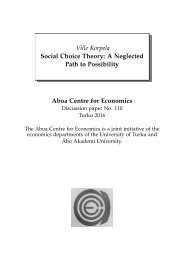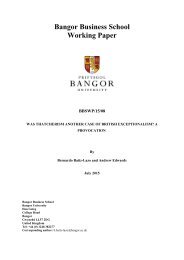MEMORANDUM
n?u=RePEc:hhs:osloec:2016_018&r=hpe
n?u=RePEc:hhs:osloec:2016_018&r=hpe
You also want an ePaper? Increase the reach of your titles
YUMPU automatically turns print PDFs into web optimized ePapers that Google loves.
on 9 September for Harvard and remain there until Christmas. He would then leave for<br />
Japan and Tahiti and not to return to Bonn until the end of April 1931. 123<br />
Schumpeter had talked with Emil Lederer, professor at Heidelberg, about his high<br />
appreciation of Leontief’s talent and the habilitation issue and. 124 Marschak, Leontief’s<br />
colleague at the Kiel Institute would leave in the autumn of 1930 to do his habilitation with<br />
Lederer at Heidelberg and remain there as Privatdozent.<br />
Schumpeter had little to say about Leontief’s plan for the Eisenaufsatz. He found<br />
Leontief’s letter of 31 May, even with enclosed Problemstelling, too brief to fully<br />
comprehend Leontief’s approach. He agreed that with iron the problem at stake was<br />
completely different from that of consumption goods and agricultural products which both<br />
were simple to deal with. The material seemed to Schumpeter to ask for exponential<br />
curves which could reflect the cyclical oscillations after corrections for population, price<br />
level and income but Leontief’s approach did not comply with that. As the iron price<br />
would be suitable for a theoretically really well underpinned investigation, Schumpeter<br />
expressed deep regrets that they could not remain in contact in the near future due to his<br />
forthcoming trip to America and Japan. 125<br />
In October 1930 the roof started to tumble, the prospects for a brighter employment<br />
possibilities in the Weimar republic vanished. Leontief wrote to Schumpeter that the<br />
budget cuts (Sparmassnehmen) had reached the Kiel Institute. The Prussian and the Reich<br />
financial support had been merged. The immediate consequence was the dismantling of<br />
the Astwik department. Leontief was told that he was allowed to finish the Eisenaufsatz but<br />
from 1 April 1931 he would have to find something else. As Leontief considered it<br />
virtually impossible for him to find another position in Germany, somewhat in despair he<br />
conveyed to Schumpeter that it would have to be either America or England. As Gerhard<br />
Colm had just returned from England and told Leontief that his paper there had evoked<br />
great interest, Leontief added that he preferred England if he had to leave. He asked<br />
Schumpeter for advice about a position, making it clear that a “productive” position would<br />
be much preferred over a stipend. 126<br />
Schumpeter responded to Leontief from Harvard at the end of November 1930. He<br />
regarded it as an unfortunate mishap that the austerity measures had hit before habilitation<br />
had been possible. Schumpeter recommended to enlist the help of Lederer to try to get<br />
123 Schumpeter revised his itinerary slightly to stay in USA beyond Christmas so that he could<br />
attend, and indeed chair, the founding of the Econometric Society in Cleveland, Ohio on 29<br />
December 1930.<br />
124 Lederer and Schumpeter had both been members of the German Socialization Commission,<br />
chaired by Karl Kautsky after World War I.<br />
125 Schumpeter to Leontief, 25 August 1930.<br />
126 Leontief to Schumpeter, 22 October 1930.<br />
51





